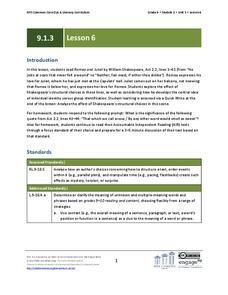Curated and Reviewed by
Lesson Planet
This Grade 9 ELA Module 1: Unit 3, Lesson 6 lesson plan also includes:
- EngageNY Resources (.html)
- Grade 9 ELA Module 1: Unit 3, Lesson 6 (.docx)
- Grade 9 ELA Module 1 Unit 3 Overview (.pdf)
- Grade 9 ELA Module 1 Unit 3 Overview (.docx)
- Grade 9 ELA Module 1 Unit 3 Lesson Text (.pdf)
- Grade 9 ELA Module 1 Unit 3 Lesson Text (.docx)
- Grade 9 ELA Module 1 Overview (.pdf)
- Grade 9 ELA Module 1 Overview (.docx)
- Grade 9 ELA Module 1 Performance Assessment (.pdf)
- Grade 9 ELA Module 1 Performance Assessment (.docx)
- Grade 9 ELA Module 1 Performance Assessment Text Analysis Rubric (.pdf)
- Grade 9 ELA Module 1 Performance Assessment Text Analysis Rubric (.docx)
- Grade 9 ELA Module 1 Performance Assessment Synthesis Tool (.pdf)
- Grade 9 ELA Module 1 Performance Assessment Synthesis Tool (.docx)
- Grade 9 ELA Curriculum Map (.pdf)
- Grade 9 ELA Curriculum Map (.docx)
- Join to access all included materials
The balcony scene from Romeo and Juliet takes center stage as class members consider the structural choices Shakespeare makes, i.e., having Romeo appear first in the scene and having Juliet appear unaware that Romeo is listening to her musings. For homework, class members write a paragraph responding to a prompt that asks them to consider the significance of Act 2, scene 2, lines 43–44: “That which we call a rose / By any other word would smell as sweet."
23 Views
14 Downloads
CCSS:
Designed
Additional Tags
Instructional Ideas
- Conclude the lesson by asking class members to consider how the impact of the scene would be different if Romeo had not overheard Juliet's musings
Classroom Considerations
- The sixth in a 20-lesson unit that uses Romeo and Juliet as an anchor text
Pros
- The 11-page resource includes a list of the Common Core standards that form the basis of the lesson, the plan, a vocabulary list, discussion questions and sample responses, a Quick Write prompt, and a homework assignment that asks class members to consider the significance of the line in act 2, 2, lines 43–44: “That which we call a rose / By any other word would smell as sweet.”
Cons
- None



